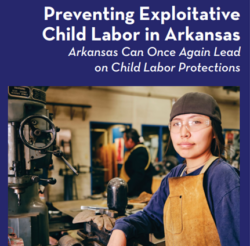
A new report by Arkansas Advocates for Children and Families finds that Arkansas child labor violations increased significantly over the past decade, both at the state and federal level. The number of cases, violations and penalties were all on the rise in the years immediately before Arkansas rolled back an important child labor employment certificate requirement in 2023.
The full report is available to read or download at this link.
AACF’s analysis of child labor cases revealed that from 2020 through 2023, the number of violations at the state level rose 266%, with the financial penalties growing 600% during that same period. The biggest violators were in food service, with that industry (mostly restaurants) accounting for 78% of state-level cases in recent years and 48% of federal cases from 2001 to 2022.
The report’s analysis of U.S. Department of Labor data also showed that, when compared with six surrounding states, the prevalence of child labor violations in Arkansas is at or near the top. That holds true in all measures, including number of cases, violations, the number of minors involved in violations, and penalties assigned.
A state-level analysis also showed that in the year since Arkansas eliminated the requirement for businesses to file an employment certificate when hiring workers younger than 16, state investigators have opened far fewer cases.
“We know what works because child labor protections, such as employment certificates, had been in place in Arkansas for more than a century,” said Pete Gess, AACF’s Economic Policy Director and the author of the report. “We all want teenagers to learn the valuable lessons that come from work experience. But their employment should not come at the expense of their safety or educational progress.”
Other findings in the report include:
- At the state level, more than half the violations from 2020-24 (50.5%) were for allowing employees under 18 to work more hours than permitted by law.
- The second highest number of violations from 2020-24 involved employers that had not filed the previously required employment certificate when hiring 14- and 15-year-olds.
- When it was required, the violations involving the certificates were often paired with other child labor violations, including hiring minors in hazardous occupations.
The report also suggests policy solutions to increase child labor protections, including:
- Reinstating employment certificates for minors. Newly released research shows that the certificates reduce child labor violations.
- Allowing restitution to victims of child labor violations, which could help alleviate barriers to reporting.
- Enacting whistleblower protections for those who report child labor violations and allowing individuals to file lawsuits against employers who violate the law.
- Developing targeted outreach and education for food-service employers so they can better understand the legal requirements.
- Dedicating funding to hire one or more state investigators, rather than depending on complaints to learn about possible violations.
